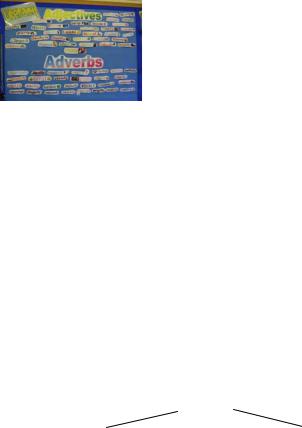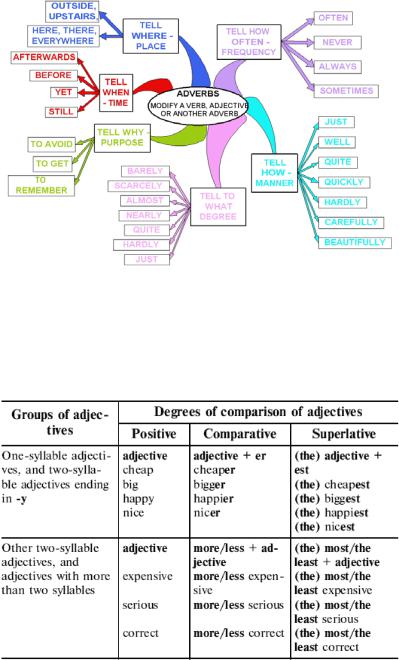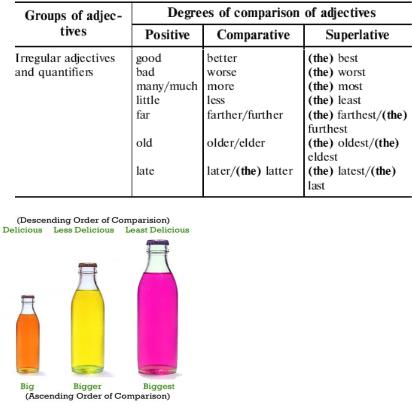
English Grammar in Context
.pdf4.Work in pairs. Tell your partner about some accident which happened to you using some of the expressions from exercise 3.
Example: Once I was wandering in the forest when a strong wind began to blow. It happened so that a gust of wind....
5.Alex and Martina are living together. Read their phone conversation. Fill in the gaps with some, any or a:
M: Hi, I’m at the supermarket. Have we got …..... bread? A: Yes, we’ve got …. bread, but we haven’t got …... .butter. M: OK, so we need …...... butter. Is there …... milk?
A: No, there isn’t. Andwe need …...... meat and ….. eggs. M: Right, have we got …... fruit?
A: We’ve got ….. big bag of oranges, but we haven’t got ….... apples. M: OK, I’ll get …....... more fruit. And …..... .cheese.
A: And can you get ….. big bottle of water too? M: Yes, OK. See you later. Bye.
6.Imagine the same situation in your family. Work in pairs and decide what you should buy at the supermarket asking your partner questions.
7.Put in A / AN or THE. Sometimes you don’t need either word – you leave it blank”:
1.“Is that your wife?” “No, my wife’s …. woman in ………. red dress.”
2.I work with ………. man and two women. ………. man is quite nice, but ………. women are not very friendly.
3.What’s in ……… newspaper?
4.Can you show me ………. that book, please?
5.What’s ………. name of ………. woman in ………. blue dress?
6.……….. water turns into ……….. ice at 0 degree C.
7.I like ………… steak, but I don’t like ……….. eggs.
8.She lives in …… nice flat on ………. fifth floor of ……….. old
house.
9.It’s terrible – ……….. eggs are $ 2 ……….. dozen.
10.There was ………. boy and ………. girl in the room. ……….. boy was Japanese but ……….. girl looked foreign. She was wearing ………… fur coat.
8. Put in A / AN or THE. Sometimes you don’t need either word – you leave it blank:
1.Have you got ……….. camera?
2.You need ……. visa to visit ……. foreign countries, but not all of
them.
81
3.When we reached the city center, ………… shops were still open but most of them were already closed.
4.Jack has got ……….. very long legs, so he’s ……….. fast runner.
5.I’m looking for …… job. And did Ann get ………. job she applied
for?
6.Did ………. police find ………. person who stole your bicycle?
7.We went out for ………… meal last night. ………… restaurant we went to was excellent.
8.It was warm and sunny, so we decided to sit in ………… garden.
9.Jane is ……….. teacher. Her parents were ……….. teachers too.
10.There’s no need to buy any milk. …………. milkman brings it every morning.
9. Some of the blank spaces below need ARTICLES, others do not. Fill in the articles where needed:
1.Tobacco is one of …… most important products of ….. South.
2.…………. fresh air is needed by all people.
3.…………. cotton which comes from ………… Alabama is better than
………. cotton which comes from ………… Oklahoma.
4.………… air in this room is fresh.
5.………. important products which we ger from …… India are
……….. tea, ……… cotton, and ………… rice.
6.…………. telephone seldom rings in our home.
7.…………. silver is …………. conductor of …………. electricity.
8.I get on ………… train at ………… same place every day.
9.………… rain and ………… sun are needed for …………. raising of………. vegetables.
10.Mary is waving to us from across …………. street.
10. Complete the sentences using one of the following. Use the where necessary:
(the) basketball (the) questions (the) history (the) hotels (the) meat (the) lies (the) information (the) patience (the) people (the) water (the) grass (the) spiders
1.My favourite sport is __.
2.___ we were given wasn't correct.
3.Many people are afraid of __.
4.A vegetarian is somebody who doesn't eat __.
5.The test wasn't very difficult. I answered all __ without difficulty.
6.Do you know ___ who live next door?
7.__ is the study of the past.
82
8.George always tells the truth. He never tells __.
9.We couldn't find anywhere to stay in the town. All ___ were full.
10.__ in the pool didn't look very clean, so we didn't go for a swim.
11.Don't sit on __. It's wet after the rain.
12.You need ___ to teach young children.
11.Some of these sentences are correct, but some need the (perhaps more than once). Correct the sentences where necessary. Put 'RIGHT' if the sentence is already correct:
1.Everest was first climbed in 1953.
2.Milan is in north of Italy.
3.Africa is much larger than Europe.
4.Last year I visited Mexico and United States.
5.South of England is warmer than north.
6.Portugal is in western Europe.
7.France and Britain are separated by Channel.
8.Jim has travelled a lot in Middle East.
9.Chicago is on Lake Michigan.
10.The highest mountain in Africa is Kilimanjaro (5,895 meters).
12.Put in the or a/an where necessary. If the sentence is already correct, put 'RIGHT':
1.Sun is star.
2.Tim lives in small village in country.
3.Moon goes round earth every 27 days.
4.What is highest mountain in world?
5.I'm fed up with doing same thing every day.
6.It was very hot day. It was hottest day of year.
7.I don't usually have lunch but I always eat good breakfast.
8.If you live in foreign country, you should try and learn language.
9.We missed our train because we were waiting on wrong platform. We were on Platform 3 instead of Platform 8.
83

U n i t 13
ADJECTIVES AND ADVERBS
Adjective |
Adverb |
|||
describes a person, a place or a thing |
describes a verb, an adjective or |
|||
and goes before a noun |
|
another adverb and answers the |
||
|
|
|
questions: How? How often? When? |
|
Example: a clever man, a beautiful |
Where? |
|
||
girl, a naughty child |
|
Example: The boy plays the drums |
||
|
|
|
||
|
|
|
loudly. |
|
|
|
|
1) most adverbs |
add -ly to the |
|
|
|
adjective (badly) |
|
|
|
|
2) adjectives ending in y →i (happy – |
|
|
|
|
happily) |
|
|
|
|
3) irregular adverbs: good – well |
|
|
|
|
fast – fast, hard – hard |
|
|
|
Adjectives |
|
|
|
|
|
|
|
gradable |
|
Non-gradable |
||
can be combined with an adverb like |
can be combined with adverbs like |
|||
reasonably or extremely etc to |
absolutely or totally to add emphasis, |
|||
quantify that adjective, e.g. |
e.g. |
|
||
fairly happy, rather irritable |
absolutely furious, slightly frustrated |
|||
Adverbs |
|
Gradable |
Adverbs |
Non-gradable |
|
|
adjectives |
|
adjectives |
extremely |
|
angry |
absolutely |
awful |
fairly |
|
cheerful |
completely |
impossible |
rather |
|
happy |
entirely |
terrible |
very |
|
hurt |
totally |
wonderful |
|
|
pretty, really, quite |
|
|
84

Degrees of comparison of adjectives
Put more/most before one syllable adjectives which are past participles, e.g. tired – more tired – the most tired
lost – more lost – the most lost
Use less or least before any adjective to make it weaker, e.g. famous – less famous
85

Продолжение табл.
To talk about a large difference, use a lot or much, e.g.
It’s a lot more expensive than that
one.
To talk about a small difference, use a little or not much, e.g.
These shoes are a little cheaper than those ones.
To say there is no difference, use as.........as, e.g. This blouse is as tight on me as that one.
To make the adjective weaker, use not as.....as, e.g. The film is not as good as I expected.
Adverbs form degrees of comparison in the same way as adjectives, e.g. fast – faster – fastest
often – more often -most often
Adverb or adjective
There are three normal positions for adverbs:
*at the beginning of a sentence – Last night I saw them in the park.
*in the mid-position – He has already returned from Poland.
*at the end – He did it very carefully.
If there are several adverbs in a sentence you must out them in the following order: manner – place – time.
86

In some cases there is a difference in the meaning of an adverb which sometimes uses -ly and sometimes doesn’t. Adverbs that change meaning include: hard (hardly), direct (directly), short (shortly), wide (widely), late (lately), free (freely), wrong (wrongly), right (rightly) etc.
Example: I saw the UFO high over the mountains.
He thinks highly of Aboriginal beliefs.
Initial position adverbs: |
however, then |
* connecting adverbs |
last night, tomorrow |
* adverbs of time |
usually, once a year |
* some adverbs of frequency |
maybe, perhaps |
* some adverbs of certainty |
seldom, rarely |
* negative adverbials with |
Seldom have I seen him so happy. |
inversion |
carefully |
Carefully he placed the slide under the
* adverbs of manner (for emphasis) microscope.
Mid-position adverbs: |
definitely, certainly |
* adverbs of certainty |
He will definitely win the cup. |
* adverbs of indefinite |
often, seldom, rarely |
She often loses her keys. |
|
frequency |
quickly, slowly |
* adverbs of manner |
nearly |
* adverbs of completeness |
completely, quite |
* adverbs of degree |
just, even |
* focus adverbs |
He didn’t even apologise for forgetting |
|
my birthday. |
End-position adverbs: |
She crossed the lane slowly. |
* adverbs of manner |
She walked into the park. |
* adverbs of place |
We saw her only last week. |
* adverbs of time |
I go to the swimming-pool twice a week. |
* adverbs of definite frequency |
|
Let’s practice:
1.Write what the underlined word is: adjective or adverb:
1.Fast runners win races. …… adjective …………….
2.Mathematics is difficult. …………………………...
3.She’s a good typist. …………………………………
4.She behaved rudely to her boss. …………………….
5.You’ve done well in your test. ………………………
6.The clowns are very funny. ………………………….
87

7.She’s a pretty girl. …………………….
8.He runs fast. …………………………..
9.Ann is very sad. ………………………
10.She plays the piano beautifully. …………………….
2. Use one of the words from the box to complete each sentence below:
hard, hardly, short, shortly, right, rightly, high, highly, late, lately, wrong, wrongly
1.I .......... ever see her nowadays – she’s so busy.
2.Sally thought very ......... indeed of the gypsy’s fortune-telling powers.
3.The interviewer ................ claimed that the house was haunted.
4.She thought long and ….. about whether to take part in the experiment.
5.Tell Marie I’ll see her ......... .
6.You’ve done this calculation …....... .
7.They were just saying that they hadn’t seen you ....... .
8.The car turned …....... round and went back the way it came.
9.The article stopped …....... of accusing anyone of a hoax.
3.Underline the correct item:
1.He left the room quiet / quietly.
2.Jane works hard / hardly.
3.He’s a very nice / nicely man.
4.The sun is shining bright / brightly.
5.Smoking is bad / badly for your health.
6.She behaves very good / well.
7.He always dresses smart / smartly.
8.He shouted angry / angrily at me.
9.This chair is comfortable / comfortably.
10.He smiled sad / sadly.
4. Complete these sentences:
1.There was some heavy rain last night.
Yes, it rained very ….. heavily. …………………
2.Aren’t the children quiet! Yes, they’re working very ……….
3.James has a loud voice. Yes, he always talks very …………..
4.Isn’t the teacher angry! Yes, he’s shouting very ……………..
5.Angela’s very happy today! Yes, she’s laughing very ……….
6.The telephone rang in the middle of the night. Nick was very sleepy.
7.He answered it very ……….
8.Kate likes playing slow music. Yes, she’s playing this piece very ……
88
5.Complete the sentence with the correct word from the brackets:
Example: Mice move ….. quietly …… (quiet / quietly)
1.This exercise is ……………………… (easy / easily)
2.These people are speaking ………………………….. (quiet / quietly)
3.Mr. Brown can speak English ………………………. (good / well)
4.Tigers are ………………………… animals. (brave / bravely)
5.The footballer is ………………………. (tired / tiredly)
6.Cheetahs run …………………………. (quick / quickly)
7.She is lifting the weight …………………………… (easy / easily)
8.The children are playing …………………………… (happy / happily)
9.Tony is a ………………………….. skier. (good / well)
6.Supply the proper form, ADJECTIVE or ADVERB:
1.He always does his homework ……………….. (careful).
2.He is a very ……………………………… (careful) student.
3.Come ……………………… (quick). We need your help.
4.You should drive more …………… (slow) along this road.
5.The old man walks very ………………………….. (slow).
6.Helen is a very ……………………………. (slow) student.
7.Her brother, on the other hand, learns …………… (rapid).
8.Mr. Gonzales has a …………. (permanent) visa.
9.He hopes to remain in this country ……….. (permanent).
10.This is an …………………………… (easy) exercise.
7.Work in pairs. Guess what your partner is good at. Ask each other questions using appropriate adverbs and adjectives.
Example: Are you good at playing volleyball? – Yes, I play volleyball
well.
8.Work in group. Decide where to put the adverb or adverbial phrases in the following sentences:
1.I went home. (yesterday, on foot)
2.She walked to where another coach was waiting. (up the hill, briskly, later, luckily)
3.I was in the mood to go swimming. (hardly, last night)
4.He is lying. (of course, still)
5.Stephen spoke to me. (the other day, in a friendly way, in fact)
6.It rained. (non-stop, all day, heavily, strangely enough)
7.People hide things of value. (apparently, in the attic, rarely)
8.She performed the dance.(far, slowly, too)
9.I think you should get out of the house. (to be hinest, more often)
10.I saw the comet. (only, in the sky, yesterday)
89
9. Choose the correct form:
1.I enjoyed the book. It was very interested / interesting.
2.Are you interested / interesting in art?
3.I thought the story was quite amused / amusing.
4.They were shocked / shocking when they heard the news.
5.We were all very worried / worrying when he didn’t come home.
6.It was surprised / surprising that she didn’t come to the meeting.
7.I usually find football rather bored / boring.
8.Are you frightened / frightening of spiders?
10.Work in pairs. Tell each other about your interests or worries using adjectives from exercise 9.
11.Complete the sentences for each situation. Use the word given +
+the ending ~ing or ~ed:
1.The film wasn't as good as we had expected. (disappoint-)
a.The film was __.
b.We were __ with the film.
2.Diana teaches young children. It's a very hard job but she enjoys it __. (exhaust-)
a.She enjoys her job but it's often __.
b.At the end of a day's work, she is often __.
3.It's been raining all day. I hate this weather. (depress-)
a.This weather is __.
b.This weather makes me __.
c.It's silly to get __ because of the weather.
4.Clare is going to the United States next month. She has never been there before. (excit-)
a.It will be an __ experience for her.
b.Going to new places is always __.
c.She is really__ about going to the United States.
12. Complete the sentences using one of the following words:
amusing / amused |
confusing / confused |
exhausting / |
exhausted |
|
annoying / annoyed |
disgusting / |
disgusted |
interesting / |
interested |
boring / bored exciting / excited |
surprising / surprised |
|
||
1.He works very hard. It's not __ that he's always tired.
2.I've got nothing to do. I'm __.
3.The teacher's explanation was __. Most of the students didn't understand it.
4.The kitchen hadn't been cleaned for ages. It was really __.
5.I seldom visit art galleries. I'm not particularly __ in art.
6.There's no need to get __ just because I'm a few minutes late.
7.The lecture was __. I fell asleep.
90
